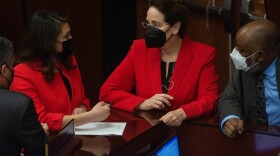This week officially marked the halfway point of Nevada’s 81st Legislative Session. And with less than 60 days until lawmakers are forced to end the session, they’re beginning to turn their attention to some of the most controversial bills of the year. That includes abolishing the death penalty and reforming the state’s election laws. Joining us now to talk about those measures is KUNR’s Political Editor Paul Boger.
NOAH GLICK: Paul, thanks for joining us. So, abolishing the death penalty. Let’s start there.
PAUL BOGER: Nevada is one of 15 states that's considering abolishing the death penalty this year. That's according to the Death Penalty Information Center. It's quite simple, the death penalty has always been controversial. It's a moral thing for a lot of people, and it's becoming a lot harder for states to execute people. A lot of states have lethal injection. They're depending on those lethal injection drugs that are becoming harder to get because companies don't want to be associated with the death penalty. So, it's becoming simpler just to convert a lot of these death penalty cases, or sentences, into life in prison without parole. So that's what this bill would essentially do. Of course, prosecutors are against this bill. And there are lots of supporters, including some victims and family members of people who are on death row, who say this also hurts them as well. It's a controversial bill.
GLICK: Do you have a sense of whether this bill will become law?
BOGER: It's really hard to say at this point. This is a bill that I think [was] brought up a couple of years ago, 2017, my first session here. It went nowhere. I don't even think it got out of committee. I do think this bill will make it out of committee, but it's hard to say because prosecutors are in charge of the Senate. The Senate majority leader is a prosecutor. The head of the senate judiciary committee is a prosecutor. So it's going to be difficult to say if this actually gets it out of the building. And, of course, the governor has sent mixed messages about it, as well. And lastly, the death penalty transcends party. So it's one of those issues where some Republicans [are against the death penalty as a] moral obligation. You know, “vengeance is mine sayeth the Lord.” And then you have people on the left who also think it's a problem. So it's going to be really difficult to say.
GLICK: Lawmakers also considered AB321 in the Assembly Elections and Legislative Operations Committee, yesterday. I know we’ve talked about election reform a few times during the Friday morning round-ups. What did we learn from this bill hearing?
BOGER: So, essentially we knew that lawmakers were going to try to make those changes that we saw last year in AB4 ahead of the 2020 election, permanent. That's what this bill does. There are a couple of key changes. There's an opt-out clause. So, people who do not feel comfortable getting a ballot by mail — they like to vote in person, they're going to continue to vote in person and that's what they want to do — they can actually opt-out and not have a ballot sent to them. Otherwise, ballots will be sent to all registered voters, just like they were ahead of the 2020 election. There is one key difference. Under this new proposal, election officials will begin to purge voter rolls. And when I say purge voter rolls, I don't mean just kick everybody off. You know, people who have been inactive for a number of elections, people who have died, people who have definitely moved and are registered in other states, those people will be removed from the voter rolls. That is somewhat of a concession to Republicans. That is something they really wanted to have seen done ahead of last year's election that wasn't done. So making these changes permanent and some cleanup of the voter rolls.
GLICK: Now these aren’t the only bills lawmakers are considering, right? What else are you keeping an eye on?
BOGER: So a few bills I kept my eye on this week. There's AB 400, changing how we determine cannabis DUIs. Essentially, to determine whether somebody is driving under the influence of cannabis, police can test their blood [for cannabis]. THC stays in a person's blood for weeks, sometimes months after they use it, depending on their body weight and how much they use, even if they're not intoxicated. So that's been a problem. [There’s] a great write-up by Colton Lockhead from the Las Vegas Review-Journal about it, I definitely recommend that.
Decriminalizing jaywalking. Believe it or not, jaywalking in Nevada is a misdemeanor, and according to the hearing that day, the state spends as much as $900,000 a year jailing jaywalkers. So this would make jaywalking a civil penalty payable by $100 fine.
Of course, there's ending the prohibition on paying student-athletes to use their likeness in video games. That's coming from the Speaker [Frierson], a former Nevada football player. This is a big deal.
And then, restarting data collection and analysis on traffic stops to find bias indicators.
All of these are really important bills that are making it through. And of course, we're talking about closing budgets. So, money, money, money.
GLICK: Quickly, [I want to also ask you about the budget.] The governor issued guidance about the budget yesterday on how to use a majority of the money the state will get from federal coronavirus relief. What do we know so far?
BOGER: What we know is that we're still waiting on federal guidance, right? But the governor has laid out how he'd like to see the money used. You know, he is the top Democrat in the state. The Democrats are in charge of the legislature. This was written with lawmakers in mind. It's probably going to be exactly how they spend the money.






